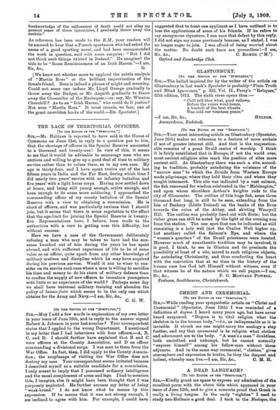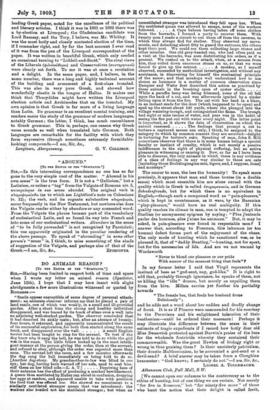A DEAD LANGUAGE ?
[To VIE EDITOR or TRY "SPECTATOR.") Sin,—Kindly grant me space to express my admiration of the excellent poem with the above title which appeared in your issue of June 12th, and to give a concrete proof that Greek is really a living tongue. In the early "eighties" I used to study neo-Hellenie a good deal. I took in the Neologoe, the leading Greek Greek paper, noted for the excellence of its political and literary articles. I think it was in 1881 or 1882 there was a by-election at Liverpool ; the Gladstonian candidate was Lord Ramsay, and the Tory, I believe, was Mr. Whitley. It was the most hotly and closely contested election of the time, if I remember right, and by far the best account I ever read of it was from the pen of the Liverpool correspondent of the paper. It was written in beautiful Greek, which only needed an occasional turning to "Liddell-and-Scott." The rival views of the Liberals (q5iXsAe6Ospoi) and Conservatives (avvrriprocol) were clearly set forth. To me it was at once a revelation and a delight. In the same paper, and, I believe, in the same number, there was a long and highly technical account of the building and armament of a first-class ironclad. This was also in very pure Greek, and showed how wonderfully elastic is the tongue of Hellas. It makes one think that Thucydides might have written the Liverpool election article and Archimedes that on the ironclad. My own opinion is that Greek is far more of a living language than Latin. Its grammar is an excellent mental training, and renders easier the study of the grammar of modern languages, notably German ; the latter, I think, has much resemblance to Greek grammar. This is, perhaps, one reason why Greek verse sounds so well when translated into German. Both languages are remarkable for the facility with which they form expressive (though sometimes extremely formidable. looking) compounds.—I am, Sir, &c.,















































 Previous page
Previous page